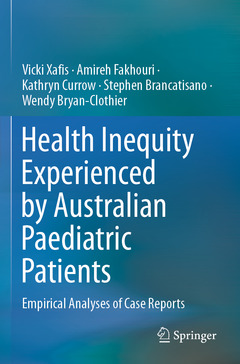Description
Health Inequity Experienced by Australian Paediatric Patients, 1st ed. 2021
Empirical Analyses of Case Reports
Authors: Xafis Vicki, Fakhouri Amireh, Currow Kathryn, Brancatisano Stephen, Bryan-Clothier Wendy
Language: English
Subjects for Health Inequity Experienced by Australian Paediatric...:
Keywords
Health Inequity; Health Disparities; Social Determinants of Health; Aboriginal and Torres Strait Islander; Socioeconomic Disparities in Health; Determinants of Health; Child Health and Wellbeing; Paediatric and Adolescent Healthcare; Health Disparities and Health Equity; Maternal and Child Health
105.49 €
In Print (Delivery period: 15 days).
Add to cartPublication date: 07-2022
158 p. · 15.5x23.5 cm · Paperback
105.49 €
In Print (Delivery period: 15 days).
Add to cartPublication date: 07-2021
Support: Print on demand
Description
/li>Contents
/li>Biography
/li>Comment
/li>
This book provides rare insight into how real children/adolescents? lives unfold as a result of health inequity. The authors present the findings of empirical research into the health and social circumstances of 61 Australian children/adolescents, as reported by healthcare professionals who attended to their medical needs, revealing how healthcare professionals deal with health inequity on the ground. Profound inequities in the health and wellbeing of children/adolescents worldwide have been the focus of intense research for decades. The extent to which children/adolescents? health and wellbeing is impacted by violence, poverty, their inability to access integrated healthcare services, parental and adolescent substance abuse, unemployment, poor living conditions, poor nutrition, a fractured social support network, disrupted education, and lack of transportation, is widely recognized. While essential, statistical analyses alone cannot reveal the faces of those experiencing health inequity. This work highlights the need for urgent coordinated action to address health inequity so that children and young people have a chance to lead a full life in good health. It is relevant to researchers and practitioners whose work relates to improving children and young people?s lives.
?This book should be required reading for those who influence policies developed by all the sectors mentioned above and their funding and administrative bodies ? and politicians in particular? (Anonymous Reviewer).




